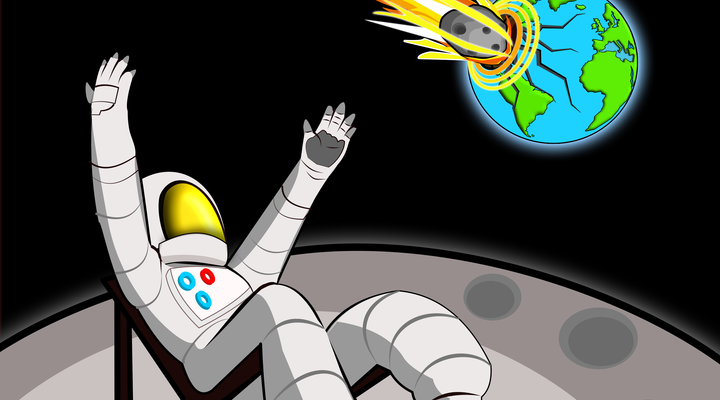On Asteroid Day (and indeed everyday) let’s remember Earth is the only place in the Universe or Multiverse where we know there is intelligent life. It would be tragically ironic if we got back to the Moon next decade only for the astronauts to see Earth struck by an asteroid – our one avoidable natural hazard.
We view buying car, home, health and other insurance as a normal part of being responsible and intelligent don’t we?
Well, about 66 million years ago the dinosaurs were wiped out arguably because they did not have an insurance policy - one provided by a space program - against the Chicxulub asteroid (nor did they have opposable thumbs but that’s a whole other evolutionary story). Ignorance did not translate to bliss!
We now stand on the shoulders of these and other giants to be able to see deep into space. Shouldn’t we then spend a bit of treasure and time as insurance against an asteroid, an actual hazardous object (AHO), smashing us out of existence? It is humanities one avoidable natural hazard IF we prepare enough and don't make sky surveying difficult (particularly around dusk) by launching too many satellites. And some recent research shows that asteroid impacts frequency has increased over the last 300 million years.
We have the technology to deflect an object if we know about it early enough (eg NASA’s Double Asteroid Redirection Test or DART mission –contracted with Elon Musk’s SpaceX) and we have done lots to find, catalogue and study long period comets and asteroids. Such strike mitigation is where the cliché of an ounce of prevention being worth a tonne of cure is particularly true – “simple” laser ablation may work if a Potentially Hazardous Object (PHO) is found early enough. Like much space-orientated work strike mitigation technology (eg European Flyeye, Large Synoptic Survey Telescope, NASA’s NEO - Near Earth Object – Camera, lasers and survey techniques) will have cross over application in other fields.
We can see and track lots of PHOs and even use measures such as the Torino Scale to attribute risk to observed PHO’s. Our current complacency is built on a thorough analysis, mainly of the northern hemisphere’s skies observing the solar system’s planetary disk. Space is however pretty big, leaving lots of room for low luminosity objects to surprise us or approach from the day side – we can’t rank objects we have not yet seen. This year we have had unforeseen asteroid visits and what if another bigger Oumuamua-like interstellar baguette is hurtling towards the sun with Earth in its path? Even asteroids that don’t pose an existential threat can create devastation with an airburst or a ground or ocean impact and all actually hazardous objects will be NEO’s before they strike (even if they are not currently close).
Its sometimes funny to think of dinosaurs looking up at the sky ruefully regretting their lack of a space program but we don’t want a race of super evolved, intelligent cockroaches drawing a similar picture in 100M years time – “Those humans, they had a space program, telescopes and were still too stupid and cheap to buy existential insurance! They spent too much money on guns, apples and beer.”
So, is there really intelligent life on Earth? NASA’s under resourced (but wonderfully named) Planetary Defense Officer (Lindley Johnson) and his equivalents elsewhere must sometimes wonder!
Oh and why the number #5691 (or #52665 on the alternative design showing the number assigned to Asteroid Brian May)? Well one of the Space Nuts podcast co-presenters - astronomer and author Professor Fred Watson - has an asteroid named him with the catalogue number 5691! Check out Episode 88 (1 Feb 20218) for commentary of Elon Musk's SpaceX launch of his old Tesla.
PROFITS ON THE SALES OF 'ASTEROID IGNORANCE IS NOT BLISS' DESIGN-BASED PRODUCTS WILL BE DONATED TO THE VERY ENGAGING AND INFORMATIVE SPACE NUTS PODCAST VIA PATREON HTTPS://WWW.PATREON.COM/SPACENUTS
How You can Help
- Be interested, ask questions, lobby your leaders, take part in the citizen science projects.
- Some sample sites to get involved
- org/get-involved/planetary-defender.html
- (there are two great interviews with the inspiring Shed of Science Observatory school teacher Russel Durkee & astronomer Alessandro Nastasi on the 16 Jun 2021 Planetary Radio podcast – The Planetary Organisation provides Eugene Shoemaker Near Earth Object grants to amateur astronomers)
- https://www.nasa.gov/planetarydefense/organization
- https://www.esa.int/Our_Activities/Space_Safety
Find out More:
The ANU’s Dr Brian Tucker acts to save the Southern Hemisphere's asteroid detectiion program
Could life on Earth be wiped out by a killer asteroid? Yes according to a Naked Scientist report.
Sampling space rocks, the perils of re-directing asteroids also from The Naked Scientists
Twenty million Chelyabinsk-sized asteroids could have near Earth orbits, warn astronomers
International efforts to identify Earth-bond asteroids ramp up (From Star Stuff on Australian Broadcasting Corporation 5 Feb 2014. Replaced with the ‘Spacetime with Stuart Gary’ podcast).
Asteroid Day 2016 Conference Report from Youtube
Daniel & Jorge’s “Will an Asteroid Kill You”
Dinosaur extinction:
Dinosaur extinction from BBC's Inside Science
Drilling the 'Dinosaur Meteor' crater shows immense geological upheaval at time of impact.

